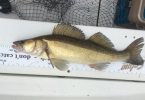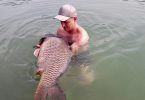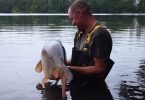When the autumn settled in and the fishing season reached its climax in northern Minnesota, my brother and I used to take our canoe to an island in the middle of the Red Lake River. We relished the rich nature surrounding us, the incandescent stars and the northern lights that kept us company throughout the night. In our situation, no more joy would have been necessary other than to land a huge channel catfish that had mistakenly decided to make the gently flowing rapids by the island its home.
Preparations
We never had much in the way of high tech fishing gear or equipment. We did, however, have one significant advantage. Our father purchased an aluminum canoe for us that became the focal point of our summers. I have endless memories of walking down to the river, my brothers and I carrying the upside down canoe on our heads, walking like yoked oxen to the river bank. I also remember our mother picking us up from wherever we happened to end up and could find a phone – usually no more than 30 miles downriver.
In any event, we did have the canoe. That gave us an opportunity to get out to an island in the Red Lake River without getting wet, a major advantage given that it gets a bit cold (even in August) during a Minnesota night. All we needed was a coffee can filled with as many worms as we could collect in five or so minutes and a big bottle of water or soda – whatever was available. Sometimes we even had hotdogs to grill over the fire but those were the special times.
Bait Fishing
We loaded our gear in the canoe and made it across to the island, fighting the current that could make someone less prepared take a trip down the river. We knew the river well so we always put in upstream to make sure we could make it to the point of the island where the current subsided. At that point, the sun would be setting in the sky and we would need to find crotches (“Y” shaped branches) for our rods to start fishing. It was easy finding crotches given the woodland of northern Minnesota.
It is hard to properly explain why but there is a time-window when bait fishing works on the rivers we grew up on. The window would only be open for about 45 minutes and if you missed it you had no chance of landing the “suckers” (bottom feeding fish of the carp family) you needed as bait. If you were on time – you would have more bait than you would ever need. If you were too late, you would be using your hotdog meat to try to get a channel cat to bite.
The Fire
The importance of a raging fire cannot be understated. If you sit on a darkened riverbank, your soul sinks into your shoes as you feel the cold dampness of the night creeping in and the river before you. Darkness also inhibits you from monitoring the fishing rods hanging in their crotches in front of you, waiting to tell you when a fish has struck.
Building a bonfire requires a bit of skill, especially when the conditions are tending towards damp. If you remembered to take an old newspaper, you would usually get by; otherwise dried leaves and small twigs would do the trick eventually. If you happened to forget the matches though, no matter how many Native American movies you have watched, there truly is no hope of starting a fire.
The beauty of the fire rests not only in the warmth and illumination it provides but also in the magical way it can make your mind dance from one thought to another trying to understand the meaning of life. When the fire is first blazing, fishing becomes momentarily a secondary pursuit. In such moments, the bright embers can instill a sense of meaning to the whole human experience. The silver gum wrappers tied to the end of our rods could sparkle and reflect not only the fire but the gentle motion of the river flowing past. We sat back, stared at the moonlit sky and waited for any obvious movement from the rods that would let us know the action was about to commence.
When the night would end, which we begrudgingly accepted by falling asleep, the gentle embers would provide just enough warmth to stop us from shivering until dawn. No matter how long one slept in, throwing a few pieces of wood on the fire in the morning would reignite its essence and provide a degree of welcome warmth and cooking possibilities depending on what was at hand.
The Freight Train
We called it the freight train – the moment a channel cat was hooked and wanted to run away. For a few moments you saw the rod jerking in its crotch and then, if you were per chance asleep, the rod would be in the river. If you were awake, you needed to dive for the rod and press the release button on the reel to let the line run as long as it needed. When a big catfish hits, it is pointless to try to fight it immediately given its nearly prehistoric strength.
To make matters more complicated, when you are on the riverbank it is possible to follow the direction of the fish upriver or downriver as necessary but when you are on an island your tactics are decidedly more limited. We often used more than 25 pound test line to try to give ourselves a fighting chance but the real issue was whether you had the patience to slowly work down the strength of the fish and bring the freight train to a gradual halt.
When a big channel cat is tired, it slowly starts to become deadweight. But even in such times, one last burst of pyrotechnic energy can snap a line in an instant with no time to react, destroying a good hour of clever gamesmanship.
Victory (or Defeat)
The defining moment happens at the very end when the catfish reaches the shallows and, even given its exhausted state, tries to make a few last desperate attempts to escape. Any number of times, such attempts prove successful. Either my brother or myself (whoever lost the lottery as to whose rod had hooked the fish) would wade into the shallow water, flashlight in hand, trying to follow the line to its rowdy source and then to drag the fish onto the shore.
The task was ripe with danger because the dorsal fin of a channel catfish has a boney spike that can create a nasty, infectious gash in you hand if you are not careful. At the moment you reach for the line near the fish, you would try to pull the line and use whatever limbs were available to get it ashore – utilising a few good sweeping kicks would usually do the trick (avoiding the possibility of implanting the dorsal fin in one of your hands).
Victory or defeat at such times was somewhat meaningless because you obtain so much respect for a big channel cat that has fought for more than an hour for its survival. When you were able to get the fish ashore, you could spend the rest of the night happily hearing the reassuring splash of its tail, fighting against the metal stringer in the shallows.

Below is a poem written a few decades ago to describe the emotional experience of cat-fishing with my brothers.
Two Brothers sit between a fire and water’s edge
At the point of an island in a river stream,
Current splitting the waters to either side,
Watching silver gum wrappers
Nodding slowly at the tips of t
heir fishing rods,
Reflecting the raging fire
Burning incandescent behind them
And casting dancing shadows
Onto the sandy riverbank.
As midnight approaches the action begins,
A witching hour when the moon is right
And tonight, appearing delightfully over the water,
A luminous sphere casts a lustrous reflection
Onto the sparkling surface of the river,
Dancing a sultry tango.
Golden flames of the campfire intermix
As if a magical connection between
The earth and the sky.
One jerk and a silver gum wrapper descends,
Slipping off the tip of the rod,
Turning into darkness as it falls.
Two brothers rise with hushed excitement,
As if a catfish might hear their voices.
The fishing rod is pulled from its crotch
To be held in hand, waiting anxiously
For the catfish to swallow the treble hook,
Consuming a meal soon to prove fatal.
At such a precious moment
No sibling rivalry could exist,
Nor thoughts of inherent jealousy,
Nor any struggle for intellectual superiority
Nor any unspoken contempt for each other,
Only a stupid bottom-feeding fish
Lurking at the end of the line
And by the river flowing slowly by
Like the time of our fleeting youth
The soft glow of a dying campfire,
Illuminates the triumphant scene
On an island at water’s edge
In the middle of an August night
The only sounds that of the river rolling past
And the intermittent splash
Of the channel cat in the shallows,
Deafening as they each mourn
The passing of an immaculate night.








